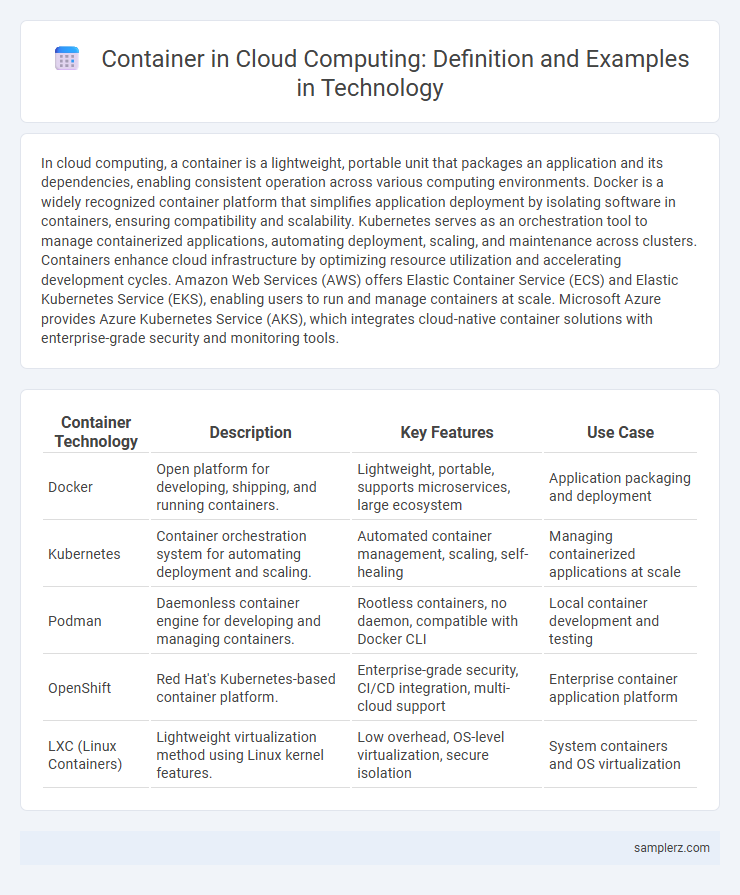In cloud computing, a container is a lightweight, portable unit that packages an application and its dependencies, enabling consistent operation across various computing environments. Docker is a widely recognized container platform that simplifies application deployment by isolating software in containers, ensuring compatibility and scalability. Kubernetes serves as an orchestration tool to manage containerized applications, automating deployment, scaling, and maintenance across clusters. Containers enhance cloud infrastructure by optimizing resource utilization and accelerating development cycles. Amazon Web Services (AWS) offers Elastic Container Service (ECS) and Elastic Kubernetes Service (EKS), enabling users to run and manage containers at scale. Microsoft Azure provides Azure Kubernetes Service (AKS), which integrates cloud-native container solutions with enterprise-grade security and monitoring tools.
Table of Comparison
| Container Technology | Description | Key Features | Use Case |
|---|---|---|---|
| Docker | Open platform for developing, shipping, and running containers. | Lightweight, portable, supports microservices, large ecosystem | Application packaging and deployment |
| Kubernetes | Container orchestration system for automating deployment and scaling. | Automated container management, scaling, self-healing | Managing containerized applications at scale |
| Podman | Daemonless container engine for developing and managing containers. | Rootless containers, no daemon, compatible with Docker CLI | Local container development and testing |
| OpenShift | Red Hat's Kubernetes-based container platform. | Enterprise-grade security, CI/CD integration, multi-cloud support | Enterprise container application platform |
| LXC (Linux Containers) | Lightweight virtualization method using Linux kernel features. | Low overhead, OS-level virtualization, secure isolation | System containers and OS virtualization |
Introduction to Containers in Cloud Computing
Containers in cloud computing, such as Docker and Kubernetes, provide lightweight, portable environments that include applications and their dependencies, ensuring consistent performance across different platforms. These container technologies optimize resource utilization by isolating processes within shared operating systems, enhancing scalability and deployment speed. Container orchestration tools automate container management, enabling efficient scaling, load balancing, and recovery in cloud-native applications.
Key Features of Containers
Containers in cloud computing, such as Docker, offer lightweight virtualization by packaging applications with their dependencies, ensuring consistent environments across multiple stages of development and deployment. Key features include rapid start-up times, resource efficiency through shared operating systems, and portability across cloud platforms like AWS, Azure, and Google Cloud. Isolation capabilities also enhance security by running applications in separate user spaces without the overhead of traditional virtual machines.
Popular Container Technologies in the Cloud
Docker stands as the most popular container technology in cloud computing, enabling developers to package applications and their dependencies into portable containers. Kubernetes, an open-source container orchestration platform, is widely used to automate deployment, scaling, and management of containerized applications across multiple cloud environments. Amazon Elastic Container Service (ECS) and Google Kubernetes Engine (GKE) are prominent managed container services that simplify container cluster management in AWS and Google Cloud platforms respectively.
Docker: The Leading Container Platform
Docker is the leading container platform in cloud computing, enabling developers to package applications and their dependencies into portable containers. These containers provide consistent environments for development, testing, and deployment across various cloud infrastructures such as AWS, Azure, and Google Cloud. Docker's lightweight virtualization enhances scalability, accelerates delivery, and simplifies orchestration with tools like Docker Swarm and Kubernetes.
Kubernetes Orchestration for Cloud Containers
Kubernetes is a leading container orchestration platform enabling automated deployment, scaling, and management of cloud containers across hybrid and multi-cloud environments. It efficiently handles containerized applications by grouping containers into pods, providing self-healing, load balancing, and resource optimization. Enterprises leverage Kubernetes for its robust API-driven architecture, seamless integration with CI/CD pipelines, and support for microservices in cloud-native development.
Real-World Use Cases of Containers in Cloud Environments
Docker containers streamline application deployment by encapsulating software and dependencies, enabling consistent environments across multiple cloud platforms like AWS, Azure, and Google Cloud. Kubernetes orchestrates containerized applications, supporting real-time scalability and automated management in production environments such as e-commerce websites and financial services. Microservices architecture leverages containers to isolate components, enhancing fault tolerance and accelerating continuous integration/continuous deployment (CI/CD) pipelines in technology enterprises.
Microservices Architecture Enabled by Containers
Containers, such as Docker, play a crucial role in enabling microservices architecture by encapsulating individual services and their dependencies into isolated units. This approach enhances scalability, as each microservice can be deployed, updated, and managed independently within a cloud environment like Kubernetes. Container orchestration platforms efficiently handle service discovery, load balancing, and resource allocation, optimizing the performance and reliability of distributed applications.
Comparing Containers and Virtual Machines in the Cloud
Containers in cloud computing, such as Docker, provide lightweight, portable environments by sharing the host OS kernel, unlike virtual machines (VMs) which run entire guest OS instances leading to higher resource consumption. Containers enable faster startup times and greater scalability, making them ideal for microservices architectures, whereas VMs offer stronger isolation and security for multi-tenant applications. Cloud platforms like AWS ECS, Azure Kubernetes Service, and Google Kubernetes Engine primarily support container orchestration, highlighting the industry's shift towards containerization over traditional VMs.
Cloud Service Providers Offering Container Solutions
Amazon Web Services (AWS) provides container solutions through Amazon Elastic Kubernetes Service (EKS) and Amazon Elastic Container Service (ECS), enabling scalable deployment and management of containerized applications. Microsoft Azure offers Azure Kubernetes Service (AKS), a fully managed Kubernetes container orchestration service designed for seamless integration with Azure DevOps and other Azure services. Google Cloud Platform (GCP) features Google Kubernetes Engine (GKE), which automates container deployment, scaling, and operations on Google's infrastructure for optimal performance and reliability.
Future Trends of Containers in Cloud Computing
Kubernetes continues to dominate as the orchestration platform driving the future of container management in cloud computing, enabling automated deployment, scaling, and operations of containerized applications. Serverless containers are expected to grow, offering developers abstraction from infrastructure management while optimizing resource utilization and cost efficiency. Integration of AI-powered monitoring tools will enhance container security and performance, providing predictive analytics for proactive issue resolution in complex cloud environments.

example of container in cloud computing Infographic
 samplerz.com
samplerz.com